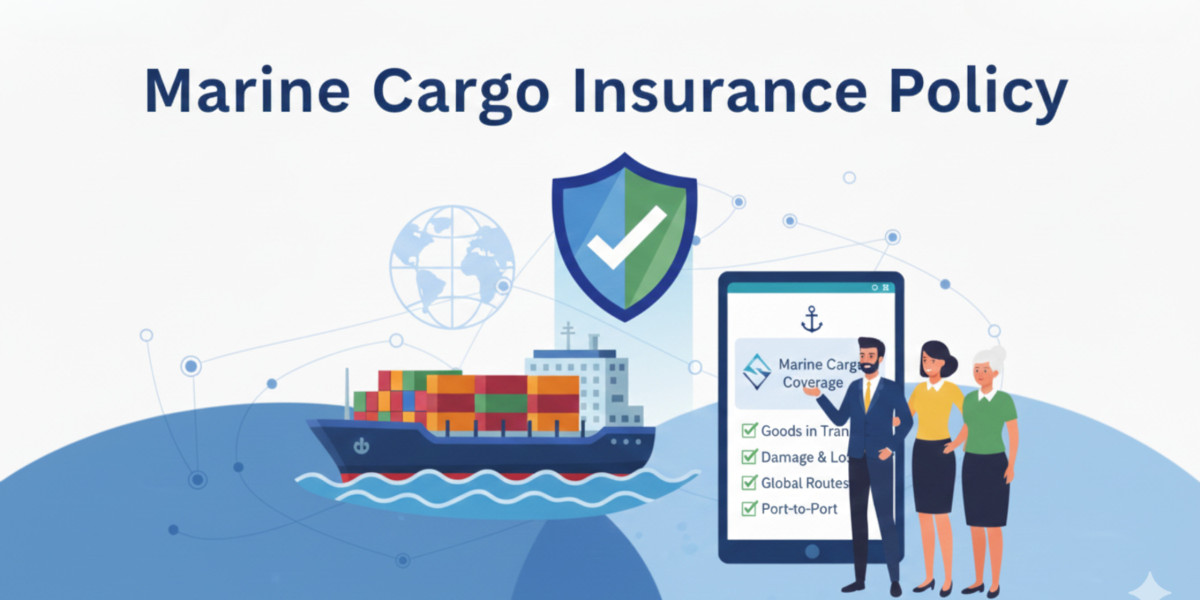Marine Cargo Insurance Policy: Complete Guide for Businesses
In today’s global trade environment, goods move across borders, oceans, air routes, and roads every second. With this massive flow of products, risks like theft, fire, damage, collision, and loss during transit are common. This is where a Marine Cargo Insurance Policy becomes essential.
Marine cargo insurance helps protect goods in transit against various unforeseen damages. Whether you are a retailer, manufacturer, exporter, importer, or logistics provider, this insurance ensures that your cargo remains financially protected until it reaches its final destination.
1. What Is Marine Cargo Insurance?
Marine cargo insurance is a specialized insurance coverage that protects goods transported by sea, air, rail, or road from loss or damage during transit. It covers physical loss caused by accidents, natural disasters, piracy, mishandling, and other travel-related risks.
Marine and cargo insurance is crucial for both domestic and international trade because even a minor disruption in transit can result in major financial loss.
2. Why Is Marine Cargo Insurance Policy Important?
Transporting goods involves multiple risk factors, including:
Weather hazards
Fire or explosion
Theft and pilferage
Accidents during loading/unloading
Mechanical damage
Vessel sinking or collision
Without marine cargo insurance, businesses may face major financial burden when such events occur. A marine cargo insurance policy ensures peace of mind and long-term financial security.
3. Key Features of Marine Cargo Insurance
A typical marine cargo insurance policy offers:
- Worldwide transit coverage
- Protection from transit-related damages
- Customizable policy structure
- Applicable to domestic and international shipments
- Affordable premium with high coverage
- Coverage for air, sea, rail, and road cargo
4. What Does a Marine Cargo Insurance Policy Cover?
The policy provides protection against:
- Fire, explosion, or lightning
- Accidents to transporting vehicle or vessel
- Sinking, capsizing, or grounding
- Earthquake, flood, tsunami, or storm
- Theft, pilferage, and malicious damage
- General average and salvage charges
- Collision or overturning of conveyance
Some insurers even offer add-on covers such as:
War risk
Strikes and riots
Temperature-controlled goods damage
Warehouse-to-warehouse coverage
5. What Is Not Covered Under Marine and Cargo Insurance?
Certain exclusions apply, such as:
Normal wear and tear
Improper packaging
Delays in transit
Willful negligence
Loss after safe delivery
Damage due to inherent defect in goods
Understanding exclusions helps businesses choose better add-ons and avoid claims rejection.
6. Types of Marine Cargo Insurance Policies
There are three major types:
a) Specific Voyage Policy
Covers cargo for a single shipment — ideal for businesses with limited exports/imports.
b) Open Marine Policy
Covers multiple shipments within a specified period (usually 12 months). Best for frequent exporters or logistics companies.
c) Annual Marine Cargo Policy
Offers full protection for all goods transported in a year, regardless of mode of transport.
7. Who Needs Marine Cargo Insurance?
This policy is essential for:
- Exporters
- Importers
- Manufacturers
- Retailers and distributors
- Freight forwarders
- Logistics companies
- E-commerce businesses transporting bulk goods
If your business moves goods from Point A to Point B, marine cargo insurance can protect your financial interests.
8. Benefits of Marine Cargo Insurance
Financial Protection: Covers losses and damages during transit.
Risk Transfer: Reduces financial burden by transferring risk to insurer.
Ease of Trade: Helps meet global compliance and contract obligations.
Customizable Coverage: Add-ons available based on shipment type.
Trust and Credibility: Insured shipments build confidence with partners and clients.
9. How Premium Is Calculated?
Premium depends on:
- Type of cargo
- Value of goods
- Mode of transport
- Shipping route risk
- Packaging type
- Claim history
Higher risk routes or fragile goods often require higher premiums.
10. How to Claim Marine Cargo Insurance?
Follow these steps:
- Notify the insurer immediately after loss.
- Provide documents such as:
- Invoice
- Policy document
- Bill of lading
- Inspection report
- Photographic evidence
- Surveyor assesses the damage.
- Insurer processes the claim.
Ensuring accurate shipment documentation makes the claim process smoother.
FAQs About Marine Cargo Insurance Policy
1. Is marine cargo insurance mandatory?
It is not always mandatory, but many international buyers require it in trade contracts.
2. Can marine cargo insurance cover international shipments?
Yes, it covers both domestic and international movement of goods.
3. Does it cover air cargo transportation?
Absolutely. Marine cargo insurance includes sea, air, rail, and road transit.
4. How long does the coverage last?
Coverage lasts until the goods reach the final destination or warehouse (based on policy terms).
5. Can perishable goods be insured?
Yes, but with special add-ons like temperature-controlled cargo cover.
Conclusion
A Marine Cargo Insurance Policy is a must-have financial safety net for any business involved in transporting goods. It safeguards shipments against unpredictable events, helps businesses comply with global trade requirements, and ensures uninterrupted operations. With customizable coverage options, flexible policy structures, and affordable premiums, marine cargo insurance is one of the smartest investments for secure and stable logistics.







